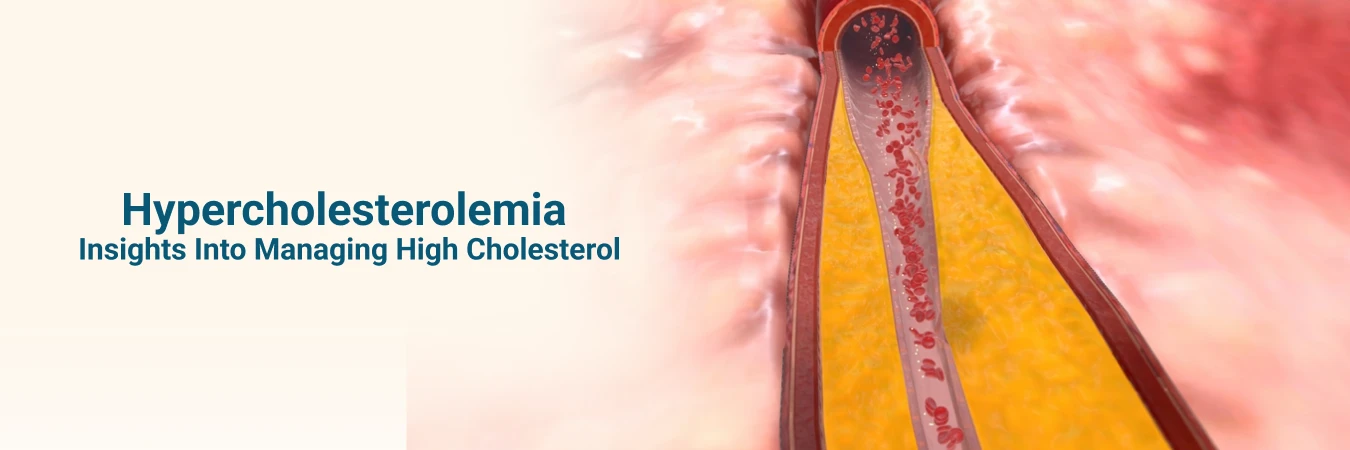- Cardiology 84
- Dermatology 45
- Endocrinology 33
- ENT 16
- Fertility 190
- Gastroenterology 78
- General-Medicine 81
- Gynecology 80
- Hematology 19
- Infectious-Diseases 33
- Neurology 52
- Oncology 34
- Ophthalmology 23
- Orthopedics 69
- Pediatrics 31
- Procedure 23
- Public-Health 144
- Pulmonology 59
- Radiology 8
- Urology 68
- Wellness 161
- Woman-and-child 77

Understanding Familial Hypercholesterolemia & Its Management
If you have familial hypercholesterolemia, your body processes cholesterol differently, increasing the risk of heart disease and heart attacks.
Inherited genetic changes cause familial hypercholesterolemia. Symptoms may not appear until adulthood, even though the disorder is present from birth. Children inheriting the disease from both parents often show symptoms, and in severe cases left untreated, it can lead to fatality before age 20.
Treatment options for both types of familial hypercholesterolemia include various medications and adopting healthy lifestyle activities.
Secure your health with a second opinion. Make informed decisions and book your appointment today!
Get A Second OpinionHow to Identify Hypercholesterolemia?
Familial hypercholesterolemia causes extremely high levels of low-density lipoprotein (LDL) cholesterol in both adults and children. LDL cholesterol, known as "bad" cholesterol, can accumulate in arterial walls, causing them to harden and narrow.
Signs of excess cholesterol may appear in specific areas:
- Skin: Cholesterol deposits are commonly found on hands, knees, elbows, and around the eyes.
- Tendons: The Achilles tendon and tendons in the hands may thicken due to cholesterol deposits.
- Eyes: High cholesterol levels can cause a corneal arcus, a white or grey ring around the iris, typically seen in older adults but also present in younger individuals with familial hypercholesterolemia.
What Causes Hypercholesterolemia?
A gene change inherited from one or both parents leads to familial hypercholesterolemia. This change prevents the body from getting rid of cholesterol, which can accumulate in the arteries and lead to heart disease.
Ready to take control of your health journey? Book your appointment now and start your path towards wellness today!
Book an AppointmentThe Risk Factors of Hypercholesterolemia
- A diet high in saturated fats, trans fats, and cholesterol-rich foods
- Lack of physical activity
- Family history of high cholesterol
- Increasing age
- Male gender (until menopause)
- Obesity
- Smoking
- Medical conditions such as diabetes, hypothyroidism, and kidney disease
- Certain medications
- High intake of refined sugars and carbohydrates
Cardiovascular Complications From Hypercholesterolemia
Familial hypercholesterolemia increases the risk of heart disease and early death. Heart attacks can strike men before the age of 50 and women beyond the age of 60. If left undiagnosed or untreated, a more severe and uncommon form of the condition can occur and prove fatal before age 20.
Can Hypercholesterolemia be Cured?
Familial hypercholesterolemia (FH) cannot be cured, but it can be effectively managed. Timely diagnosis and treatment can significantly improve overall health and life expectancy.
Medical Treatment
If blood cholesterol levels remain high despite lifestyle changes, medication may be prescribed. The choice of medication depends on factors such as age, health status, and individual risk factors:
- Medication: Prescribed to lower LDL (bad) cholesterol levels and lower the risk of heart attacks and death.
Managing familial hypercholesterolemia involves a combination of lifestyle modifications and medical treatment to optimise health outcomes.
Managing Hypercholesterolemia with Lifestyle Changes and Home Remedies
Incorporating healthy habits into your daily routine can help to minimize the risk of heart disease and manage cholesterol levels effectively:
- Lose weight: Weight loss can significantly lower cholesterol levels.
- Eat a heart-healthy diet: Focus on whole grains, vegetables, and fruits, and limit trans and saturated fats.
- Exercise regularly: Engage in moderate-intensity workouts for at least 30 minutes daily to improve quality of life.
- Quit smoking: Stop smoking to combat the illness and improve overall health effectively.
Frequently Asked Questions
Hypercholesterolemia is a condition characterized by high levels of cholesterol in the blood, specifically elevated LDL cholesterol.
Hypercholesterolemia can be caused by genetic factors (familial hypercholesterolemia) or lifestyle factors such as poor diet, lack of exercise, and obesity.
Hypercholesterolemia typically doesn't cause symptoms until complications arise, such as atherosclerosis or cardiovascular disease.
Hypercholesterolemia is diagnosed through a lipid profile blood test, which measures total cholesterol, LDL cholesterol, HDL cholesterol, and triglycerides.
Untreated hypercholesterolemia can lead to serious health problems like coronary artery disease, heart attack, and stroke.
Treatment often involves lifestyle changes (diet and exercise) and, if necessary, medications like statins to lower cholesterol levels.

- Cardiology 2132
- Dermatology 168
- Endocrinology 135
- ENT 97
- Fertility 217
- Gastroenterology 232
- General 478
- General-Medicine 1685
- Gynecology 169
- Hematology 85
- Infectious-Diseases 208
- Neurology 207
- Oncology 345
- Ophthalmology 65
- Orthopedics 187
- Pediatrics 83
- Procedure 72
- Public-Health 209
- Pulmonology 126
- Radiology 13
- Second Opinion 311
- Urology 294
- Wellness 600
- Woman-and-child 447
- Others 10217
Related Blogs
If you have any questions, please fill out the enquiry form or call us, and we will get back to you promptly.
040-68334455